Scaffolding Companies The Village
Find the best Scaffolding Experts in The Village
Get up to 3 Scaffolding Solutions quotes for your project today! Compare profiles, reviews, accreditations, portfolio, etc... and choose the best deal.
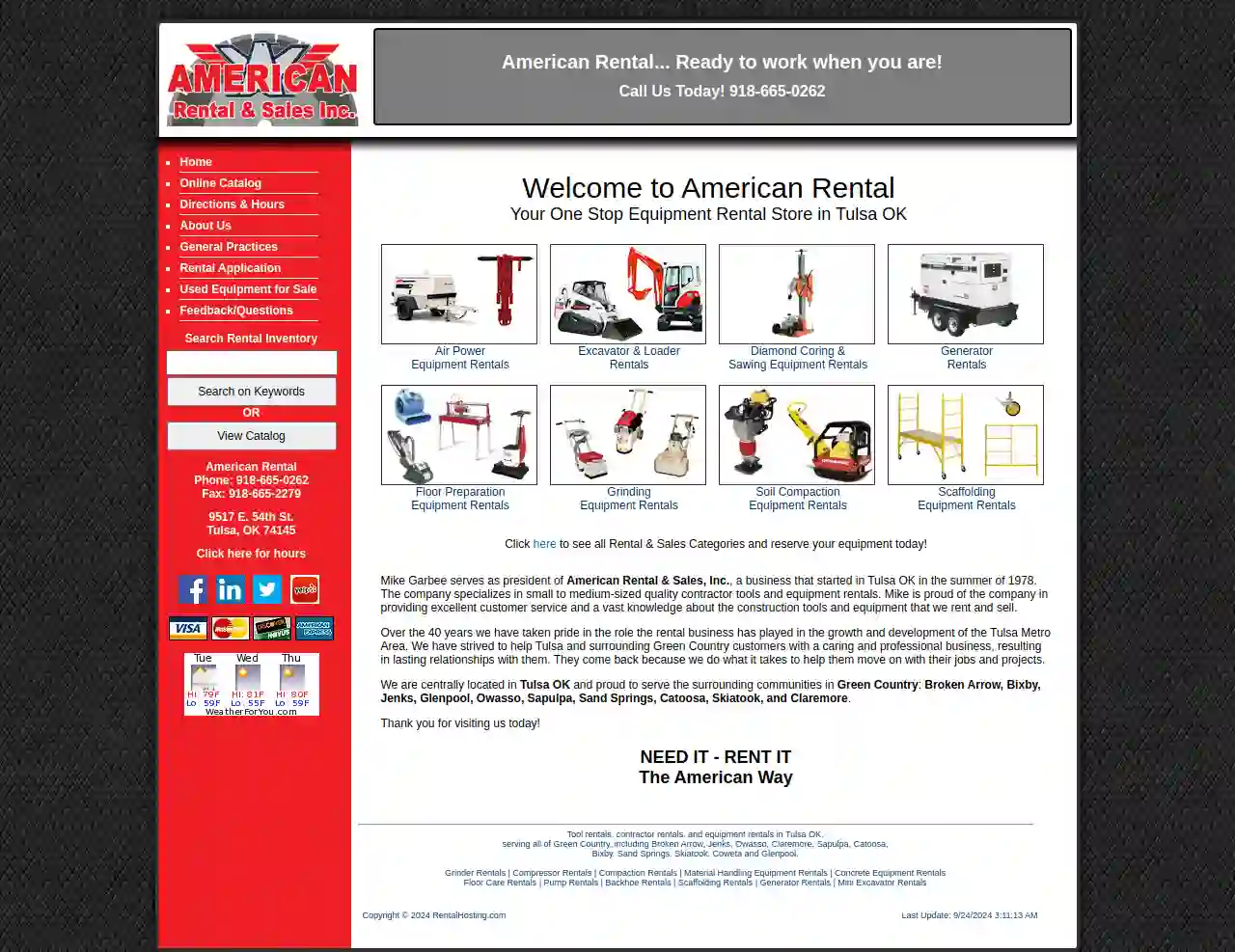
American Rental and Sales Inc
51 reviews9517 E. 54th St., Tulsa, 74145, USAmerican Rental & Sales, Inc. is a business that started in Tulsa, OK in the summer of 1978. The company specializes in small to medium-sized quality contractor tools and equipment rentals. With over 40 years of experience, they have taken pride in the role the rental business has played in the growth and development of the Tulsa Metro Area. They strive to provide excellent customer service and a vast knowledge about the construction tools and equipment that they rent and sell. They are centrally located in Tulsa, OK and proud to serve the surrounding communities in Green Country, including Broken Arrow, Bixby, Jenks, Glenpool, Owasso, Sapulpa, Sand Springs, Catoosa, Skiatook, and Claremore. They offer a wide range of equipment rentals, including air power equipment, excavator and loader rentals, diamond coring and sawing equipment rentals, generator rentals, floor preparation equipment rentals, grinding equipment rentals, soil compaction equipment rentals, and scaffolding equipment rentals. They are committed to helping their customers move forward with their jobs and projects, and they are proud of the lasting relationships they have built with their customers over the years.
- Services
- Why Us?
- Accreditations
- Our Team
- Gallery
Get Quote
Thermal Insulation Pipe Solutions
4.84 reviewsTulsa, USAbout TIPS Plant Services With over 15 years of industrial and commercial insulation experience, we are the premiere choice for all of your insulation requirements. Ensuring that all jobs, no matter how big or small in scope, are finished on time and to the highest standards, all of the lowest prices possible, guarantees a stress free and budget saving environment for our clients. Established 2008 Clients More Than 500 Projects Completed Over 6287
- Services
- Why Us?
- Gallery
Get Quote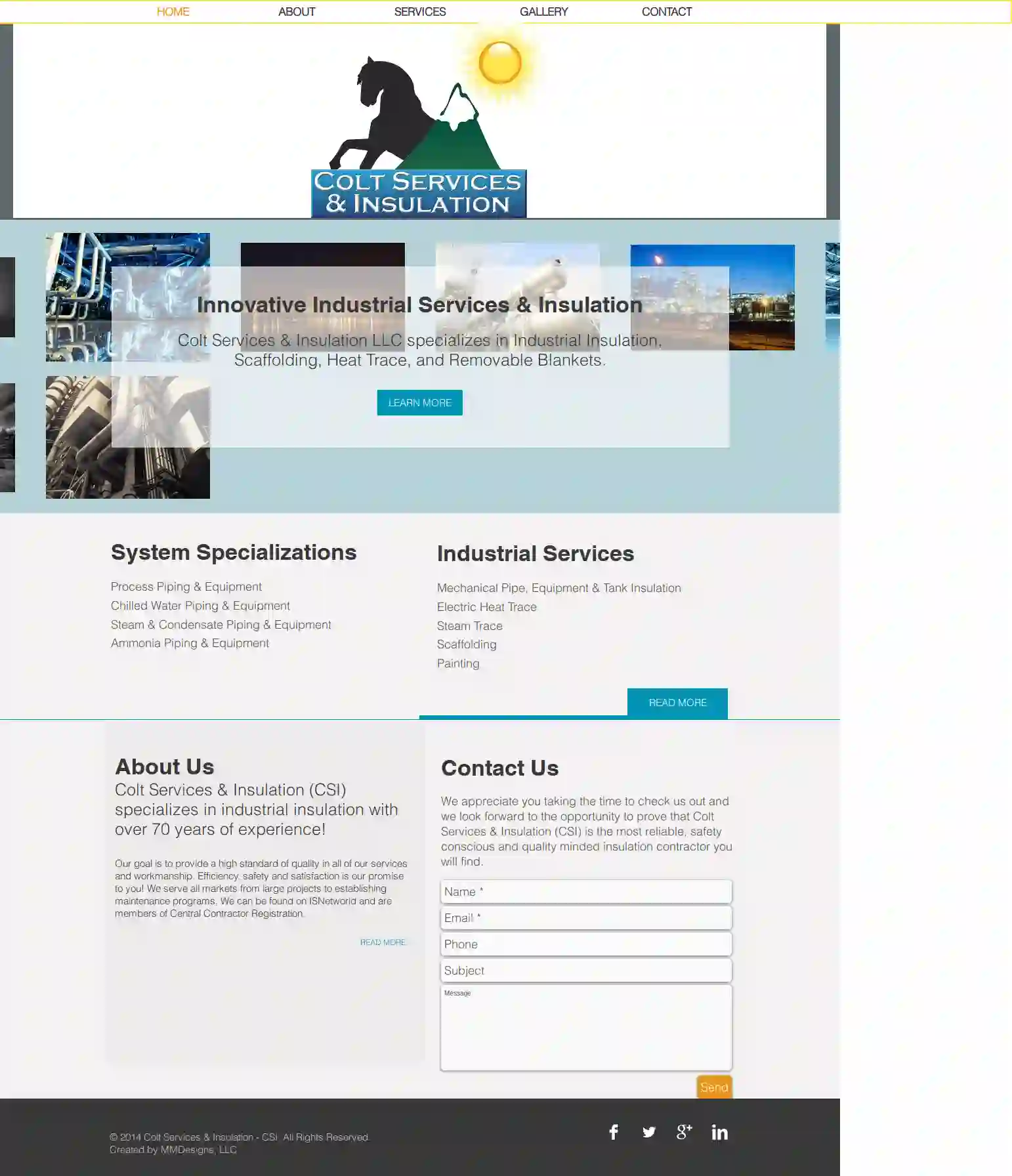
Colt Services
Tulsa, USColt Services & Insulation (CSI) specializes in industrial insulation with over 70 years of experience! Our goal is to provide a high standard of quality in all of our services and workmanship. Efficiency, safety and satisfaction is our promise to you! We serve all markets from large projects to establishing maintenance programs. We can be found on ISNetworld and are members of Central Contractor Registration.
- Services
- Why Us?
- Gallery
Get Quote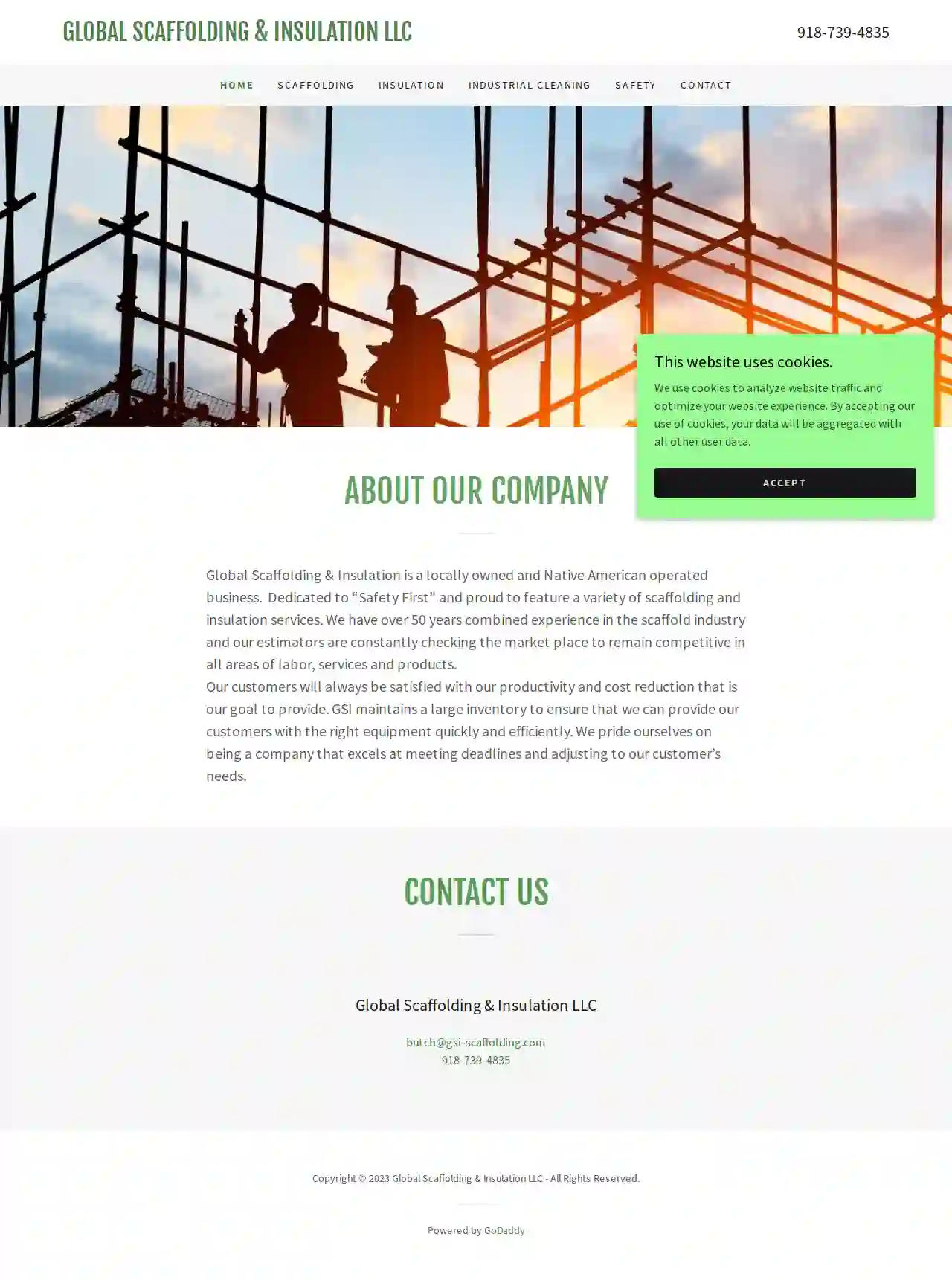
Global Scaffolding and Insulation
4.49 reviewsGlobal Scaffolding & Insulation LLC, 918, USGlobal Scaffolding & Insulation LLC is a locally owned and Native American operated business. Dedicated to “Safety First” and proud to feature a variety of scaffolding and insulation services. With over 50 years combined experience in the scaffold industry, our estimators constantly check the market place to remain competitive in all areas of labor, services, and products. Our goal is to provide our customers with productivity and cost reduction, ensuring satisfaction with our services. We maintain a large inventory to provide the right equipment quickly and efficiently, exceling at meeting deadlines and adjusting to customer needs.
- Services
- Why Us?
Get Quote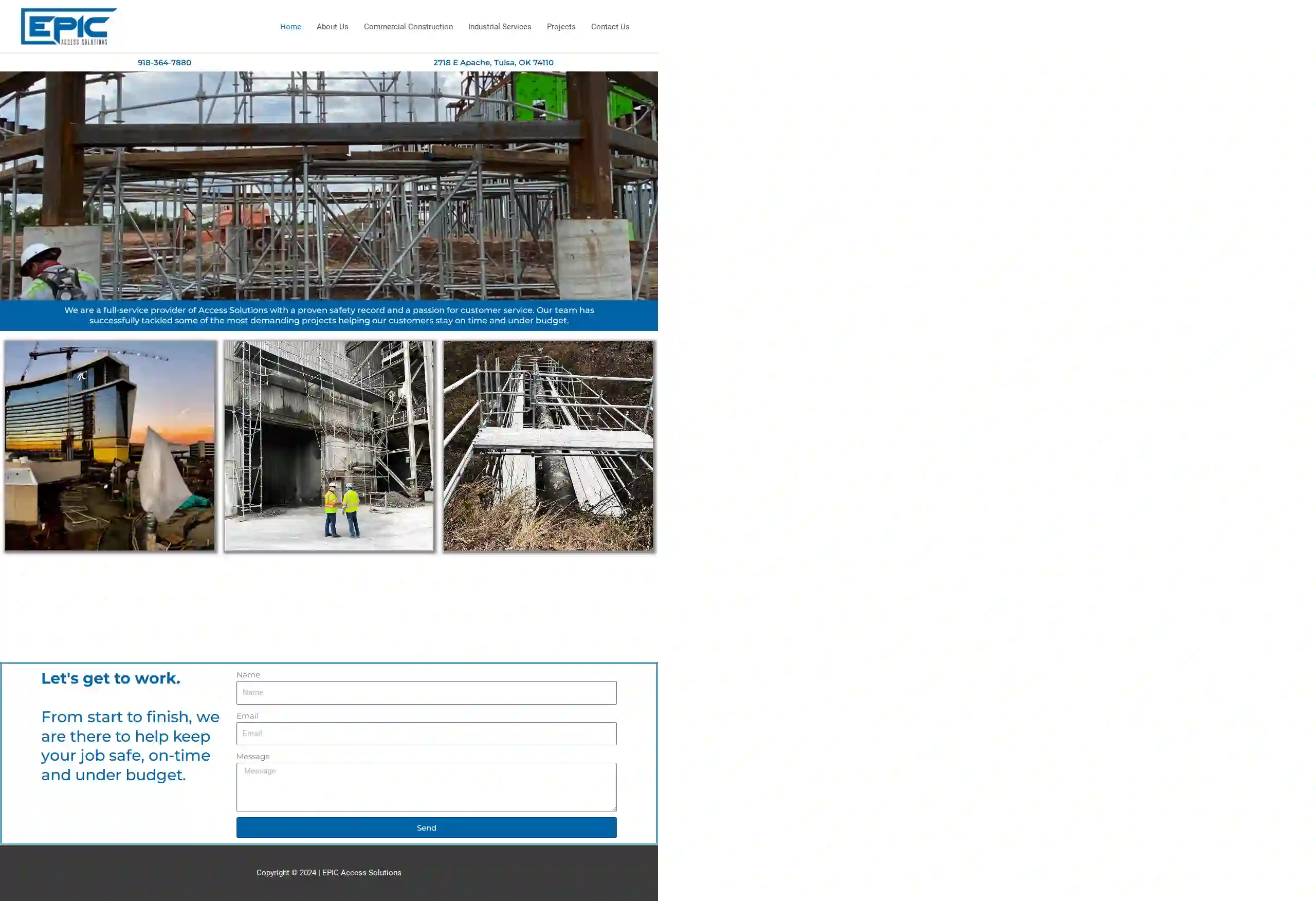
EPIC Access Solutions
4.25 reviews2718 E Apache, Tulsa, OK, 74110, USEPIC Access Solutions is a full-service provider of Access Solutions with a proven safety record and a passion for customer service. Our team has successfully tackled some of the most demanding projects, helping our customers stay on time and under budget. We specialize in Commercial Construction, Industrial Construction, and Civil Construction. Our commitment to safety is reflected in our excellent safety record and low EMR score. We are responsive, precise, and dedicated to making your job a success. From start to finish, we are there to help keep your job safe, on-time, and under budget.
- Services
- Why Us?
- Accreditations
- Our Team
- Testimonials
- Gallery
Get Quote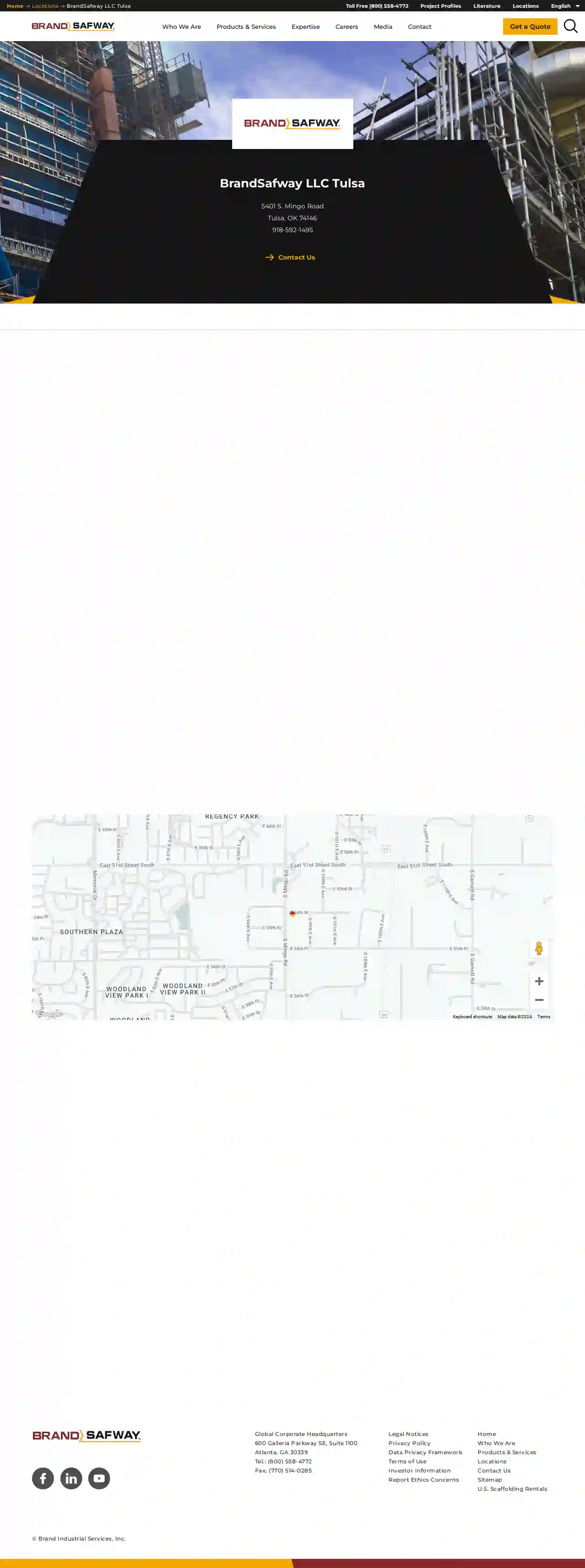
BrandSafway LLC Tulsa
4.413 reviews123 BrandSafway Blvd, Tulsa, 12345, USBrandSafway is a leading provider of access solutions, including scaffolding, aerial work platforms, and forming and shoring. With a strong commitment to safety, quality, and customer satisfaction, BrandSafway offers a wide range of services tailored to meet the unique needs of clients across various industries. Their team of experienced professionals is dedicated to delivering innovative solutions that enhance efficiency and productivity, ensuring successful project outcomes.
- Services
- Why Us?
- Accreditations
- Our Team
- Testimonials
Get Quote- Da
Dawson Building Supply and Salvage LLC
4.6102 reviewsTulsa, US- Services
- Why Us?
Get Quote - La
Ladders Of Tulsa
4.913 reviewsTulsa, US- Services
- Why Us?
Get Quote - AB
ABC Equipment Rental
4.6311 reviewsTulsa, US- Services
- Why Us?
Get Quote - Un
United Rentals
4.849 reviewsTulsa, US- Services
- Why Us?
Get Quote
Over 2,353+ Scaffolding Contractors registered
Our scaffolding contractors operate in The Village & beyond!
ScaffoldingHQ has curated and vetted the Best Scaffolding Companies near The Village. Find a top & trustworthy contractor today.
Frequently Asked Questions About Scaffolding Companies
- Steel: The most common material due to its strength, durability, and resistance to corrosion.
- Aluminum: Lighter than steel, often used for smaller projects or where weight is a concern.
- Timber: Used for decking platforms and some traditional scaffolding structures. It's less common now due to its susceptibility to rot and damage.
- Fiberglass: Used in specialized applications where electrical conductivity is a concern.
- Workers: Consider the number of workers on the scaffolding at any given time.
- Materials: Include the weight of building materials, tools, and equipment being used on the platform.
- Environmental Factors: Factor in potential loads from wind or snow, especially for taller scaffolding structures.
- Falls from Height: The most significant risk, often due to lack of guardrails, improper use of safety harnesses, or unstable platforms.
- Falling Objects: Tools, materials, or debris falling from the scaffolding can injure workers or people below.
- Scaffold Collapse: Improper assembly, overloading, or inadequate foundation support can lead to a catastrophic collapse.
- Electrocution: Contact with overhead power lines is a serious hazard when working near electrical infrastructure.
- Slips, Trips, and Falls: Wet or cluttered platforms, uneven surfaces, and loose debris can cause falls.
- Always Wear a Safety Harness: Connect your harness to a secure anchor point at all times to prevent falls.
- Keep Platforms Clear: Remove tools, materials, and debris to avoid tripping hazards.
- Never Overload the Scaffolding: Stay within the designated weight limits.
- Be Aware of Your Surroundings: Pay attention to power lines, moving equipment, and other potential hazards.
- Inspect Before Use: Check the scaffolding for any damage or defects before starting work.
- Communicate Clearly: Use hand signals and clear communication to coordinate with other workers.
- Follow Safety Training: Attend and understand all safety training provided by your employer or the scaffolding company.
What are some common materials used in scaffolding?
What is the weight limit for scaffolding?
What are some common scaffolding safety hazards?
What are some tips for working safely on scaffolding?
What are some common materials used in scaffolding?
- Steel: The most common material due to its strength, durability, and resistance to corrosion.
- Aluminum: Lighter than steel, often used for smaller projects or where weight is a concern.
- Timber: Used for decking platforms and some traditional scaffolding structures. It's less common now due to its susceptibility to rot and damage.
- Fiberglass: Used in specialized applications where electrical conductivity is a concern.
What is the weight limit for scaffolding?
- Workers: Consider the number of workers on the scaffolding at any given time.
- Materials: Include the weight of building materials, tools, and equipment being used on the platform.
- Environmental Factors: Factor in potential loads from wind or snow, especially for taller scaffolding structures.
What are some common scaffolding safety hazards?
- Falls from Height: The most significant risk, often due to lack of guardrails, improper use of safety harnesses, or unstable platforms.
- Falling Objects: Tools, materials, or debris falling from the scaffolding can injure workers or people below.
- Scaffold Collapse: Improper assembly, overloading, or inadequate foundation support can lead to a catastrophic collapse.
- Electrocution: Contact with overhead power lines is a serious hazard when working near electrical infrastructure.
- Slips, Trips, and Falls: Wet or cluttered platforms, uneven surfaces, and loose debris can cause falls.
What are some tips for working safely on scaffolding?
- Always Wear a Safety Harness: Connect your harness to a secure anchor point at all times to prevent falls.
- Keep Platforms Clear: Remove tools, materials, and debris to avoid tripping hazards.
- Never Overload the Scaffolding: Stay within the designated weight limits.
- Be Aware of Your Surroundings: Pay attention to power lines, moving equipment, and other potential hazards.
- Inspect Before Use: Check the scaffolding for any damage or defects before starting work.
- Communicate Clearly: Use hand signals and clear communication to coordinate with other workers.
- Follow Safety Training: Attend and understand all safety training provided by your employer or the scaffolding company.